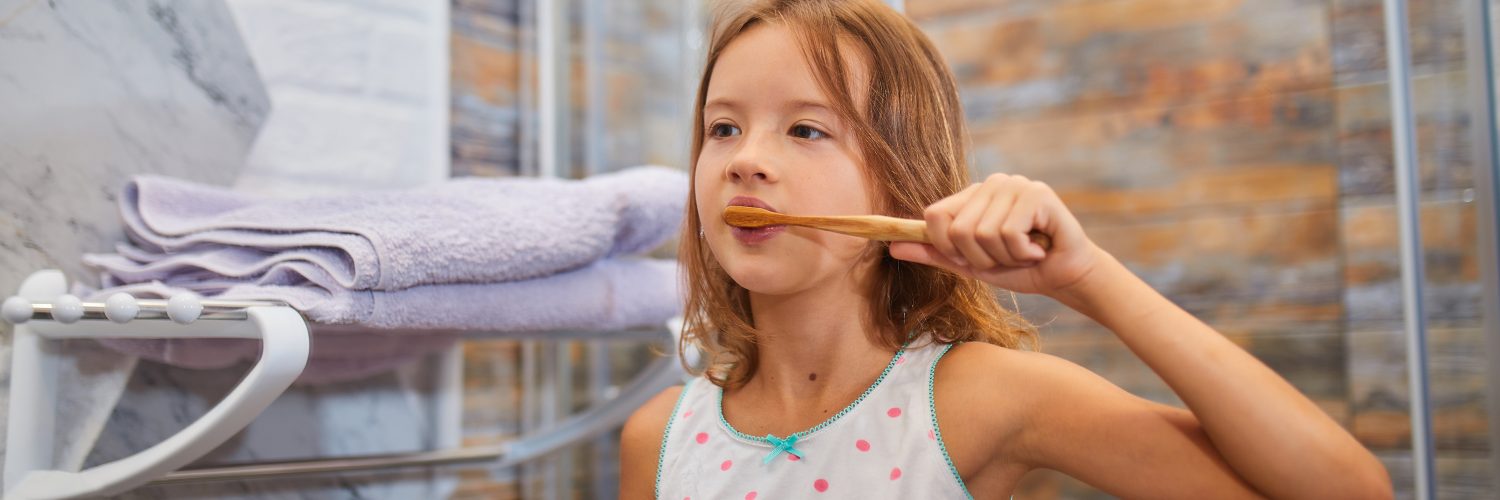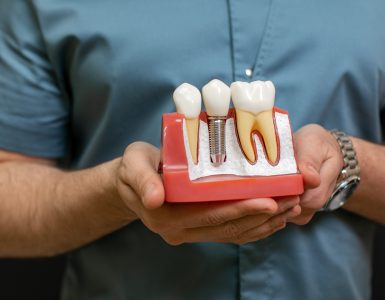From the time your child’s first baby teeth appear, it is important to look after them and as they grow older teach them how to care for their teeth themselves.
Why is it important to care for baby teeth?
You may feel that because your child’s baby teeth will eventually fall out to make way for their adult teeth, it is not so important to care for them. However, because the enamel is softer and thinner on baby teeth, it makes them more prone to damage from tooth decay. These baby teeth hold space in the jaw for the permanent teeth that are growing under the gums. If serious decay causes the tooth to be removed too early, the permanent teeth can move into the empty space. When the adult teeth start to emerge, they may have difficulty finding room causing crowding and crooked teeth. Baby teeth also help with the development of clear speech. Missing or decayed teeth can make it difficult for your child to chew, which can have an ongoing effect on your child’s nutrition should they reject some foods because of it.
When should you start?
Bacteria that causes plaque can begin to affect your child’s teeth as soon as they come through, so you should start brushing them once they appear. There are soft toothbrushes available especially designed for babies and you can begin by just brushing with water twice a day. Alternatively, you could use a soft damp cloth to rub on baby’s teeth and gums before introducing a toothbrush. From about 18 months you can begin to use a pea-sized amount of low-fluoride toothpaste specifically formulated for younger children and babies. Brushing alone is not always enough to remove all traces of plaque and left-over food. The Australian Dental Association (ADA) recommends that you begin flossing when your child has two teeth touching side by side, which is usually around the age of 2.
Teaching your child
Not only is it important that your children get into a regular oral hygiene routine, but also that they are taught the correct brushing techniques. You will need to help your child with their brushing until they are around 7 or 8 years old, and it is recommended that you continue to supervise them for a couple of years after they start brushing and flossing themselves.
- Brushing. Your child’s teeth should be brushed twice a day with a fluoride toothpaste using small circular motions. As children tend to miss some areas, make sure that all surfaces of the teeth and gums are cleaned. You could put in place a specific routine that you follow to ensure that all teeth are cleaned thoroughly. They need to brush for at least two minutes and you should teach them to spit out the toothpaste, rather than swallow it.
- Make it fun. Some children may not enjoy the teeth cleaning process, or may even just be having a bad day, so there are ways that you can encourage them. Special kid’s toothbrushes with characters, bright colours, attractive shapes or that light up can entice them. Play a special song, or make one up yourself! You could set up an egg timer for two minutes, or there are phone apps available that have a built-in timer. You child’s favourite soft toy or doll could join in the fun and have their teeth brushed too!
- Rewards. Rewarding your child for a good brushing job is a great motivator, even if it’s just a verbal “Well done”. You could set up a star chart for daily brushing with your child collecting stickers for a set period of time with a special reward at the end, such as a new toy or trip somewhere special. The phone apps mentioned above also provide positive reinforcement for your child with stickers and awards.
How important is your child’s diet?
Maintaining a healthy diet is important for your child’s oral health as what they eat and drink can have an impact on their teeth. Bacteria can build up on your teeth in a sticky layer called plaque. When this plaque comes in contact with sugars the bacteria releases acids that attack the tooth enamel. How long these sugars remain on the teeth is the main factor behind tooth decay. Whilst your child will need some sugar for energy, there are ways to ensure you can stick to healthy guidelines and protect your child’s teeth.
- Avoid sugary drinks. Whilst babies and toddlers love sweet drinks such as cordials and fruit juice, they do not need them and they can lead to tooth decay. Even milk contains sugar. It is best to offer your child water as it does not harm the teeth and helps in washing away any food particles attached to the teeth. It is best to limit milk to drink at mealtimes. It is important to never put your baby to bed with a bottle of juice, cordial, milk or formula which would allow you child’s teeth to be washed with sugar over a long period of time.
- Foods to avoid. Chewy and sticky foods such as dried fruit, muesli bars and chewy lollies stick to the teeth making it hard for saliva to wash the sugar away. Likewise, hard lollies that are sucked in the mouth continuously bathe the teeth with sugar. If your child does have them, make sure that their teeth are brushed straight after. You could save the sweet treats for mealtimes when there is usually more saliva in the mouth to wash the sugar away from the teeth. It’s good to check food labels and choose low sugar or sugar free options.
- It is best to limit the amount of snacking between meals as constant snacking continually feeds the bacteria on your child’s teeth. When you child does snack offer fresh fruit and vegetables, such as apples, pears, celery and cucumber, instead. Cheddar cheese is also a great option. These foods will help to trigger the flow of saliva helping to wash food particles away.
- Healthy choices. A balanced diet filled with calcium rich foods, such as cheese, milk and yoghurt, as well leafy greens, such as broccoli and spinach, lean meats and fatty fish will give your child all the nutrients they need to build strong healthy teeth and gums.
- Plenty of water. It is important that your child drinks plenty of water during the day. This will help to maintain the production of saliva which neutralise acids on the teeth and helps to rinse the mouth and wash food particles away.
When should your child visit the dentist?
The ADA recommends that your child’s first visit to the dentist should take place when your baby’s first tooth becomes visible or when they reach 12 months old, whatever comes first. It is important to assess the growth and development of your child’s teeth early to identify any potential problems, so your first visit should ideally take place before they turn 2 years old. Preparing your child for the visit beforehand will help to make the process go more smoothly. Your dentist is used to dealing with children and will help to ease any fears your child many have. Your dentist will be able to check the health of your child’s teeth, discuss any treatments and offer oral care advice. It is important that your child has regular check-ups so any issues can be detected early on.




